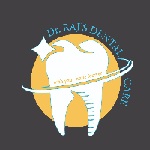Prosthetics is the field of dentistry that includes repair and maintenance of oral functions of the affected teeth through artificial devices like bridges, crowns, or dentures. The artificial devices protect your teeth from further damage. If you lose a tooth, the normal functionality of the mouth is affected such as while chewing or doing any other daily activities. This may raise a risk of gum diseases and may affect the surrounding tooth too. Prosthetic dentistry treatment can bring back your beautiful smile back as it cover up any tooth defects.
Dental implants are screw like posts that replaces the tooth roots and replace the damaged tooth with an artificial tooth. They are implanted into the bone of the jaw that provides support for the artificial teeth like crowns, bridges, or dentures. Getting a dental implant is advisable when you have one or more missing tooth, a jawbone that has reached its full growth, and among other reasons. Dental implants feel more natural and convenient than the old dentures or crowns.
Crowns are artificial caps, which look like a real tooth, placed on one or more affected tooth. When a gap is left by a missing tooth, dental bridge is done to fill this gap. There are two types mainly, Conventional and CAD CAM (Computer Aided Design and Computer Aided Milling). CAD CAM is advanced technology treatment for crowns and bridges done with precision and excellency and takes less time than conventional. In CAD CAM, the dentist takes a digital impression of your teeth through an intraoral scanner. The impression is transferred to the computer and after designing, it is sent for milling to give final shape.
Materials Used in Dental Prosthetics:
- Dentures: Acrylic Resin and Porcelain
- Implants: Ceramic, Titanium and Titanium Alloys, and Zirconia
- Bridges: Metal Alloys, Gold, Porcelain, Ceramic, and Acrylic
- Partial Dentures: Porcelain, Acrylic Resin, and Metal
- Flippers: Acrylic Resin
Metal implants comprises of gold, silver, and other elements that are durable and may last up to 10 – 15 years. But, they appear different from your natural teeth. Metal free implants are made from zirconia, a ceramic component, which has esthetic appearance. Metal-free material is used to make teeth that look like real ones.
Denture is a removable replacement of your lost teeth and adjoining tissues. Dentures fall into two categories: partial and complete.
Partial dentures are recommended when you have few natural teeth remaining in your upper and lower jaw. In partial dentures, only one or more missing teeth are replaced. Partial dentures are fitted to fill the gap created by the lost tooth. The denture is clasped to the surrounding teeth to fill the gap on the each side.
Complete dentures are suitable when all your natural teeth have lost its normal function. A complete set of artificial teeth is prepared for your upper and lower jaw. With advancement in materials and technology, complete dentures are comfortable. They provide full support to the jaws and the routine activities like chewing can be done easily. They are to be removed before going to sleep. After removing them, brush with special cleaning agent and soak them overnight to keep the plastic moist.
Maxillofacial prosthesis is a special branch of dentistry that treats any inborn and acquired deformities in the head and neck body parts. Any injuries caused by a trauma, accident or, cancer to the face and jaws get treated in maxillofacial prosthesis. It includes repairing and restoring the lost facial functions and fixing the oral structure. Maxillofacial prosthesis also includes restoration of facial esthetics, maintaining oral functions, and providing psychological support.
